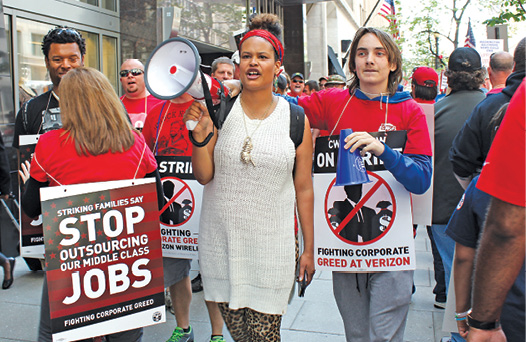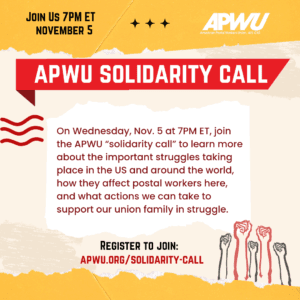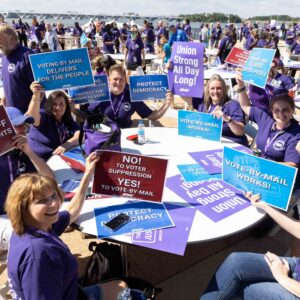July 8, 2016
Verizon Strikers Win Major Victories
Strike was ‘fight for future of work in America’
(This article first appeared in the July-August issue of The American Postal Worker Magazine)

With their heads held high, more than 40,000 Verizon workers from Maine to Virginia returned to work in June, after winning major victories in the biggest strike in recent history.
Workers stood firm throughout the 45-day strike, despite the company’s hardball tactics. Two-and-a-half weeks after the strike started, with workers feeling the loss of pay, Verizon cut their health coverage. Soon after, the telecommunications giant hired “replacement workers,” also known as “scabs,” in an effort to keep operations running.
But solidarity prevailed. The strikers remained resolute and tens of thousands of workers joined them on picket lines, including many APWU members.
Donations to the Verizon Striking Families Solidarity Fund poured in from across the country, raising over $548,000, including a $500 contribution from the APWU’s Philadelphia Area Local Retiree Chapter.
Bigger Than Verizon
The strike was bigger than Verizon. It was “a fight for the future of work in America,” wrote Christine Owens, executive director of the National Employment Law Project, in The Huffington Post.
It “captured the public’s imagination not just because of its size and duration,” she said, but because the strike exposed “the attack on good jobs in America – unprincipled and unbridled outsourcing and globalization.”
When negotiations broke down, the company had already moved 5,000 jobs overseas and was pushing to send even more jobs to Mexico, the Philippines and elsewhere. An investigation by the Communication Workers of America (CWA) revealed that workers at Verizon’s call centers in the Philippines are paid just $1.78 per hour.
Striking members of the CWA and the International Brotherhood of Electrical Workers prevailed: Under the terms of the new contract, no additional jobs will be outsourced overseas and the number of calls routed to domestic call centers will be increased.
The “unity and tenacity of the workers themselves” was the primary reason the strike succeeded, Owen wrote, but second was, “America’s growing unwillingness to countenance unsustainable economic inequality.”
The company, which had raked in $39 billion in profits in the last three years, demanded concessions from workers, including capping pension credits at 30 years, cuts to accident and disability benefits, and other provisions aimed at pushing high-seniority workers into early retirement.
During the strike, consumers’ opinion of Verizon sunk to a three-year low and analysts estimated that it cost the corporate giant 150,000 new customers. “Consumers and the broader public soured on Verizon, but stood with striking workers,” Owens wrote.
APWU President Mark Dimondstein commended the Verizon workers for their courage and resolve. “They won a great victory by standing up for themselves, their families and working people everywhere.” He also praised the APWU locals that organized members to support Verizon workers and walked with them on picket lines.
In addition to the prohibition on new overseas outsourcing, workers won substantial raises. Verizon dropped its demand that technicians had to be available to travel outside their home areas for up to two months at a time. And for the first time, Verizon Wireless retail store employees in Brooklyn, NY, and Everett, MA, have a contract.
Union members voted on June 17 to ratify the tentative agreement.
“This contract is a victory for working families across the country and an affirmation of the power of working people,” said Chris Shelton, CWA president. “It proves that when we stand together we can raise up working families, improve our communities and advance the interests of America’s working people.”



